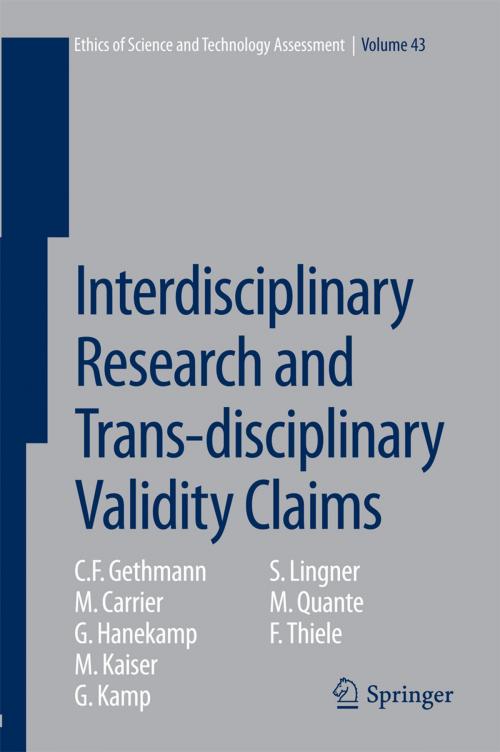Interdisciplinary Research and Trans-disciplinary Validity Claims
Nonfiction, Science & Nature, Science, Other Sciences, Philosophy & Social Aspects, Social & Cultural Studies, Social Science, Sociology| Author: | C. F. Gethmann, M. Carrier, G. Hanekamp, M. Kaiser, G. Kamp, S. Lingner, M. Quante, F. Thiele | ISBN: | 9783319114002 |
| Publisher: | Springer International Publishing | Publication: | October 29, 2014 |
| Imprint: | Springer | Language: | English |
| Author: | C. F. Gethmann, M. Carrier, G. Hanekamp, M. Kaiser, G. Kamp, S. Lingner, M. Quante, F. Thiele |
| ISBN: | 9783319114002 |
| Publisher: | Springer International Publishing |
| Publication: | October 29, 2014 |
| Imprint: | Springer |
| Language: | English |
Interdisciplinarity has seemingly become a paradigm for modern and meaningful research. Clearly, the interdisciplinary modus of deliberation enables to unfold relevant but quite different disciplinary perspectives to the reflection of broader scientific questions or societal problems. However, whether the comprehensive results of interdisciplinary reflection prove to be valid or to be acceptable in trans-disciplinary terms depends upon certain preconditions, which have to be fulfilled for securing scientific quality and social trust in advisory contexts.
The present book is written by experts and practitioners of interdisciplinary research and policy advice. It analyses topical and methodological approaches towards interdisciplinarity, starting with the current role of scientific research in society. The volume continues with contributions to the issues of knowledge and acting and to trans-disciplinary deliberation. The final conclusions address the scientific system as substantial actor itself as well as the relevant research and education politics.
Interdisciplinarity has seemingly become a paradigm for modern and meaningful research. Clearly, the interdisciplinary modus of deliberation enables to unfold relevant but quite different disciplinary perspectives to the reflection of broader scientific questions or societal problems. However, whether the comprehensive results of interdisciplinary reflection prove to be valid or to be acceptable in trans-disciplinary terms depends upon certain preconditions, which have to be fulfilled for securing scientific quality and social trust in advisory contexts.
The present book is written by experts and practitioners of interdisciplinary research and policy advice. It analyses topical and methodological approaches towards interdisciplinarity, starting with the current role of scientific research in society. The volume continues with contributions to the issues of knowledge and acting and to trans-disciplinary deliberation. The final conclusions address the scientific system as substantial actor itself as well as the relevant research and education politics.















